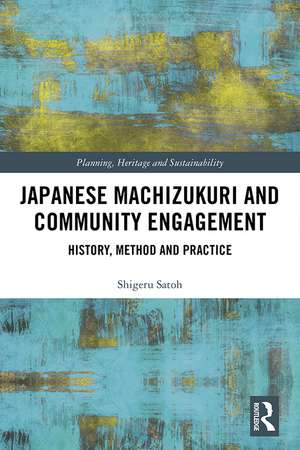Japanese Machizukuri and Community Engagement: History, Method and Practice: Planning, Heritage and Sustainability
Autor Shigeru Satohen Limba Engleză Hardback – 17 ian 2020
Japanese “machizukuri” has developed to become an exceptional example of bottom-up creative approaches based on collective action and use of local resources. Since its evolution in the 1960s, machizukuri has come to define diverse and creative community-driven management models, by which local communities are enabled to actively tackle problem-solving.
Including contributions from experts directly engaged in the process, this book explores the original development of machizukuri in Japan, its diffusion through East Asia and the positive outcomes of this transfer. Combining theoretical explanations with practical case studies, from pre-disaster planning in Tokyo, to the revitalization of historic towns and rural areas around Japan, the book looks at specific solutions, tools, and links between academics, communities, organizations, governmental bodies, and the private sector. It will appeal to researchers in planning, community engagement, architecture, urban design, and sustainable development.
| Toate formatele și edițiile | Preț | Express |
|---|---|---|
| Paperback (1) | 260.13 lei 43-57 zile | |
| Taylor & Francis – 13 dec 2021 | 260.13 lei 43-57 zile | |
| Hardback (1) | 1002.02 lei 43-57 zile | |
| Taylor & Francis – 17 ian 2020 | 1002.02 lei 43-57 zile |
Preț: 1002.02 lei
Preț vechi: 1221.97 lei
-18% Nou
Puncte Express: 1503
Preț estimativ în valută:
191.73€ • 200.72$ • 158.65£
191.73€ • 200.72$ • 158.65£
Carte tipărită la comandă
Livrare economică 07-21 aprilie
Preluare comenzi: 021 569.72.76
Specificații
ISBN-13: 9780367193522
ISBN-10: 0367193523
Pagini: 270
Ilustrații: 62
Dimensiuni: 156 x 234 x 18 mm
Greutate: 0.5 kg
Ediția:1
Editura: Taylor & Francis
Colecția Routledge
Seria Planning, Heritage and Sustainability
Locul publicării:Oxford, United Kingdom
ISBN-10: 0367193523
Pagini: 270
Ilustrații: 62
Dimensiuni: 156 x 234 x 18 mm
Greutate: 0.5 kg
Ediția:1
Editura: Taylor & Francis
Colecția Routledge
Seria Planning, Heritage and Sustainability
Locul publicării:Oxford, United Kingdom
Public țintă
PostgraduateCuprins
Preface. Acknowledgments. Contributors. List of Figures. Part 1. 1. Introduction to machizukuri. 2. Brief History of Machizukuri in Three Regions in East Asia. 3.The first generation: the emergence of machizukuri. 4. The Second Generation: Participation, Collaboration and Co-creation. 5. The Third Generation: Aiming at Open Area Management. Part 2. 6. Machizukuri Methodology and Tools. 7. Machizukuri and Planning. Part 3. 8. Regenerating the urban structure in historic districts: An approach through projects representing traditional culture and crafts, created by entrepreneurs and craftsmen in Takaoka City. 9. Discovering the authenticity of the historical landscape and the original urban context through small collaborative design projects in a local castle-town city, Tsuruoka City. 10. Revitalization of the central urban area by local residents in Nabari City, Mie Prefecture. 11. The Rebirth of Mixed-Use Blocks in the Decayed Historic Centre of Takefu in Echizen City, Fukui Prefecture. 12. Reorganization of the Local Housing Production System for Maintaining and Improving the Historical Landscape.13. The Urban Renewal Method Based on the Community Principle: The Case of the Yuyuan Area of the Shanghai Historical Scene Conservation District. 14. Develpoment of the Furano Machizukuri Company movement connecting rural areas and urban core revitalization in Furano city. 15. Post-disaster reconstruction of central Ishinomaki through the formation of local initiatives. 16. Regeneration of the cultural landscape of the fisheries city of Kesennuma through collaboration in machizukuri by multiple project-implementing bodies. 17. Community Empowerment Recovery after the ChiChi Earthquake: The Case of Taomi Ecovillage, Pu-li. 18. “SOHO City Mitaka”: Machizukuri as Creative Urban Governance. 19. Machizukuri as Glocalization: Progress in Highly Dense “shitamachi” Lower-town Areas in Collaboration with Tsukishima Community School, Tokyo. 20. Machizukuri in the Future. Glossary of Technical Terms particular to Japanese. Index.
Notă biografică
Shigeru Satoh is Professor Emeritus of Waseda University, former Director of the Research Institute of Urban and Regional Study and former President of the Architectural Institute of Japan. He has spearheaded the Japanese machizukuri movement (a community-based comprehensive approach to improving built environmental practices) both in theory and actual practice.
Descriere
Over the past few decades, Japan has faced severe earthquake disasters, an increasing ageing population, declining birth rates and widening social disparities. These issues have served to highlight gaps left by top-down governance approaches and the urgent need to create resilient societies using more traditional models.





